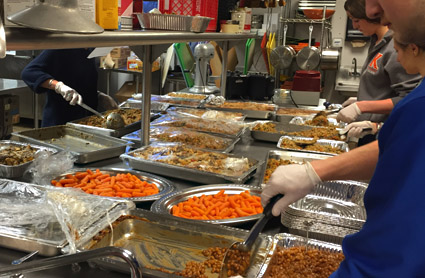
Fulfilling the food needs of an entire campus can be a pretty resource-heavy task. This is why dining services has been especially active in their efforts to create an environmentally-friendly operation. Those efforts include using locally sourced food, donating what food isn’t used, and composting what can’t be given away.
There are numerous benefits to eating locally. On top of tastier and more nutritious food, less travel time means significantly fewer carbon emissions by trucks and fewer preservatives used to keep the food fresh. Moreover, eating local foods supports local jobs and businesses. Food is considered local if it is grown or manufactured within a 150-mile radius of a given location. For K, this means much of southwestern Michigan, as well as parts of northern Indiana and Illinois. Some of these local products include apples from Crisp Country Acres, dairy products from Prairie Farms, bread from Aunt Millie’s, sushi from Hunan Gardens, and coffee from Simpatico and Kalamazoo Coffee Company. Most recently, free range eggs from Old Town Farm were added to this list, and it will continue to grow as the weather warms different fruits, and vegetables become in season in Michigan. Not limited to the dining hall, these foods can be found at the Richardson Room, the Book Cub and catered events. Look for the Michigan sticker that says “Local Flavor!”
A major part of creating a more sustainable dining operation is the reduction of food waste. Kitchen staff keep track of how much food they make in order to avoid excess waste. Still, many pounds of food go unused at every meal and ordinarily would simply be thrown away. This is where the Food Recovery Network comes in. This student group, founded last winter by Calli Brannan ’19, comes to the dining hall kitchen every Tuesday and Thursday to “recover” unused food and provide it to food insecure families in the area. In the weeks it has been active at K, the group of 16 volunteers has recovered more than 1,500 pounds of food. That translates to more than 1,000 meals to people in need. This food goes to Eleanor House, a shelter for families in Kalamazoo where more than 60 percent of the residents are children. The FRN seeks more volunteers so that it can expand its efforts and save even more food.

Not all food that’s uneaten is fit for donation. That food is composted. Every week a group of student compost interns collects between 600 and 1,100 pounds of pre- and post-consumer waste from the cafeteria and bring it to Facilities Management for composting. There, large earth tubs use augers and the natural heat from the composting process to accelerate the process. About six weeks later, the final product is used all around campus on landscape beds, notably at the Arcus Center and the new Fitness and Wellness Center. The use of compost on these areas will count toward LEED Gold certification – a trademark of sustainable buildings across the country. This symbiotic relationship enables both Dining Services and Facilities Management to run more sustainable operations, and students to live on a more beautiful campus. Moreover, compost is open to all members of the College community for use both on and off campus.
These are just a few of the growing list of efforts made by Dining Services to run more sustainably. The move toward a totally green operation is an ongoing process that continues to produce extraordinarily valuable benefits.
Text and photos by Jeff Palmer ’76
